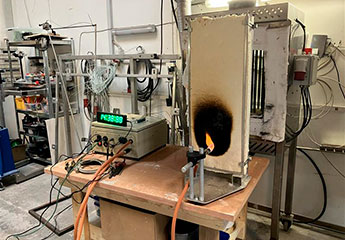Bio-based insulation materials offer great potential for reducing the CO2 footprint in constructions. However, the fire behavior of these materials represents an obstacle to their application. Upon ignition, the porous structure enables self-sustaining glowing combustion, also known as smoldering.
This flameless phenomenon occurs on solid surfaces and spreads much more slowly than a flaming fire. Due to low combustion temperatures, the fire can remain undetected for an extended period and only become visible when it reaches an advanced stage. Smoldering fires can occur at low oxygen levels and are difficult to extinguish. If additional oxygen (i.e. fresh air) is introduced to to a smoldering fire, it may transition to a flame, accelerating its spread.
Current fire classification methods are unable to account for these mechanisms. Reaction-to-fire tests, such as the Single Burning Item (SBI) test, primarily evaluate a material's ignitability and its contribution to fire growth, focusing on the early stages of fire development under flame exposure. In contrast, fire resistance classification assesses a system's capacity to withstand a fully developed fire. However, smoldering phenomena pose a different challenge, occurring either during the very early stages of fire development—before flames are present or during the decay phase, when flames have significantly diminished.
The existing research gaps regarding the complex smoldering behavior of bio-based insulation make it impossible to define accurate performance criteria based on existing standards. Consequently, designers' ability to utilize these materials is severely restricted. First, critical parameters for smoldering initiation and propagation must be identified to enable a performance assessment and extend the materials’ applicability. Achieving this requires an innovative approach that combines advanced testing and modeling methods.
Objectives of BioFireAssess
1. Addressing the fundamental knowledge gaps regarding smoldering initiation, spread, and the consequences of smoldering of bio-based insulation materials
2. Investigation and validation of a new hybrid assessment methodology integrating reduced-order tests with numerical modeling
3. Establishing a novel framework for the quantitative assessment of smoldering behavior in biobased insulation materials, aligned with practical applications in consultancy
The project is financially supported by Innovation Fund Denmark and carried out in collaboration with Lund University and industrial partners.

